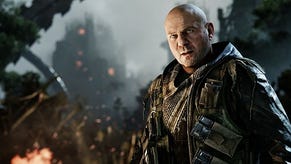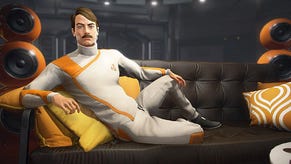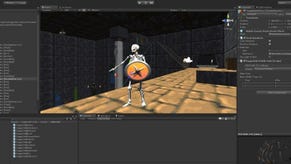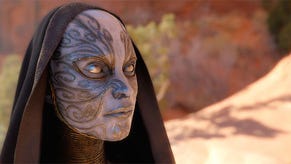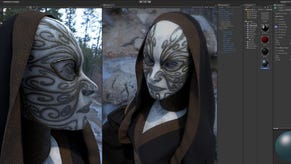Wherefore Art? The Strange Places Of Noctuelles
Dark Horizons
This is the latest in the series of articles about the art technology of games, in collaboration with the particularly handsome Dead End Thrills.
Somewhere in the region of the demoscene and modern game jam is Noctuelles, home of mysterious New Zealander Orihaus and the 'strange places' he calls 'games'. Ghostly ‘megastructures’ of stark, sometimes procedurally generated geometry, his Unity-powered projects can seem a million light years from purported genres including flight sim and survival horror. Then you get Xaxi, “a virtual memory palace of sorts, designed to teach Aliceffekt's Conlang Traumae, and examine the possibilities of learning and memory in interactive virtual environments.”
All of which begs the question: is Orihaus really happy making places for their own sake? We, of course, are getting comfortable with the idea, funding and exploring worlds and ideas that often far outstretch any explicit gameplay - and why not? But what does the future hold for Noctuelles, and what are we supposed to think of it in the meantime?
DET: What drives you to embark on these projects?
Orihaus: As the tagline for my site says, I ‘make strange places and call them games’. My main motivation is simply to make (hopefully) interesting worlds and present them in a mostly interactive format. I've gone off this path a little with Hunting Anubis as with this I initially set out with specific gameplay in mind, but for the rest of the projects it’s more a drive to create someplace for a curious player to explore.
'Noctuelles' is simply the name of my website. I don't really use it to refer to the games, though I might start doing that in the future. As an aside, I like the idea of a site being a specific location in cyberspace, which is sort of why I've been working on some web-based projects based on VRML - If anyone remembers that.
I've been putting out games under the name Orihaus for about two years, and with the support of the indie community people who enjoy this sort of thing, which is great. After getting a Steam deal through Greenlight for Hunting Anubis, a drone warfare flight sim - which for the uninitiated isn't my usual thing - I'm able to take this a step further. I'm also a frequent collaborator with Aliceffekt, a game designer/musician/illustrator who is for some reason convinced that I'm his mentor, despite it being the other way around.
DET: Lumiere is especially pretty with that black and gold colour scheme. It’s the inside of a movie camera, right?
Orihaus: I’ve never seen it like that, but that's a nice idea, though! I guess you're thinking of the Lumière brothers? But the truth is that with most of the stuff I've released so far, with the exception of Xaxi and upcoming stuff, I haven't had any specific ideas or concepts I've been trying to communicate.
DET: You won a Ludum Dare prize with that one, yes? A 48-hour contest. How improvised was Lumiere visually?
Orihaus: I won under visuals, but I got like 1000th overall. Not sure what to make of that. I’m still really pleased. When I started out I only had code; everything else was primarily built in about 14 hours after I realised my initial concept for a-- something to do with rotating around a sun? I've forgotten what I set out to build, but for the first day all I really had was that sun you can see in the distance. I realised that wasn't working out so I pulled out my procedural mesh generation code and shaders, and built the structures you see in the final product.
DET: Is the interest in procedural geometry the kernel to all this?
Orihaus: It was initially, but recently I've been doing much more manually. I was using an open source tool called Structure Synth that takes a simple scripting language and creates these detailed structures, but I felt I've hit the limit of what I could really do with it, as the language doesn't allow feedback.
DET: Does it wind you up when commenters on the internet try and constrict what constitutes a game? When they say this stuff isn’t ‘interactive enough’?
Orihaus: I don't really have much new to say on this, but it seems the consensus - at least with devs and the press - has arrived at RPS's definition: ‘If it's interactive and digital and calls itself a game it gets coverage.’ Which is great! Overall, this video is what I feel on the topic:
DET: Do you feel any kind of obligation or need to add more gameplay to what you do? Is that what Hunting Anubis represents?
Orihaus: I don't feel any obligation other than to create games that value a players time, as with free games that’s all they're really giving to you. And yes, what's traditionally considered gameplay can facilitate that! Both types of projects approach it from different angles, though. With Anubis the world facilitates the gameplay, and with, say, Xaxi, any sort of gameplay I’d potentially add would be to facilitate immersion in the world.
I've built a few prototypes, though, and interestingly I find simple horror elements a great way to immerse players and add an extra layer of depth to a game. By inducing a fear of water, say, it drastically changes the interaction the player has with a world.
DET: Ever thought of embedding some narrative in the worlds?
Orihaus: Absolutely. I've not been lucky integrating it so far, however, as abstract textless and gameplay-less worlds and multiplayer deathmatch games don't facilitate narrative very well - at least with my current skills. I do have a lot of notes, sketches and drafts for an ongoing narrative in the works, though.
DET: Any inspirations of note?
Orihaus: Étienne-Louis Boullée, Tsutomu Nihei, Tadao Ando would be a brief but broad list of architectural inspirations. The Nihei influence is more visible in Aeon, which hasn't really gotten to see the light of day. He’s always going to be relevant to procedural generation, as his works are essentially handmade representations of machine-designed worlds.
DET: Games are typically entertainment products that contain and re-purpose art, but a vocal contingent of gamers seem to want, almost need, something more. Shouldn’t we just be happy with what they are?
Orihaus: For me 'art' is simply any form of expression, which is a terribly nebulous term but it nicely sidesteps the debate. And yes, it means blatantly manipulative F2P works therefore become as much art as Dear Esther, but I don't think that that's very important. What's important is what the game is trying to communicate, and how. I think a large fraction of the people the games community is trying to get validation from do agree that games are Art, but don't really care, as the games they see aren't getting across what they’re interested in seeing from art.
DET: Aliceffekt is kind of your muse, it seems. Is the feeling mutual?
Orihaus: Hopefully! I actually learned a lot of my technical skills from working with him on projects like Siseon and Waiting For Horus. That quote about Xaxi [“memory palace” and all that] is more a mission statement than what I actually managed to build, by the way. In Xaxi I tried to teach his language by presenting each Glyph in an environmental context that would communicate its meaning. Hence, the Glyph for One is alone opposite the Glyph for Many, which is in a group; and the Nothingness Glyph is far from the island, in the emptiness. This is our latest collaboration [and this is what that’s all about].
DET: Someone might look at the credits for Hunting Anubis and see what resembles a more traditional game production outfit; or see a move towards more explicit storytelling in the bit about near-future drone warfare. What does the future hold for Noctuelles? Is it just the beginning?
Orihaus: Right now Anubis is just me handling everything except audio, and Lhasa Mencur doing everything audio. I'm not sure if I'm going to be doing much storytelling in Anubis; it's a team-based multiplayer game so it would be a big challenge. There might be some world-building scattered around for those who look for it, though.
Is Noctuelles the beginning of something? Absolutely. Maybe even just a prelude? I've got plans for more ambitious exploration games if that's what you're asking. I've got interactive fiction works in progress in the same style too. A major goal for the future would be to create an overarching linked fiction for all the works. There's a lot still left to explore. I don't think I'll be losing interest any time soon.








